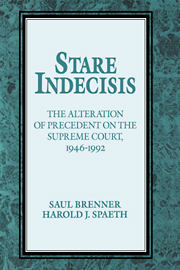Book contents
- Frontmatter
- Contents
- List of tables and figure
- Preface
- 1 INTRODUCTION
- 2 A SURVEY OF THE EMPIRICAL LITERATURE
- 3 A LIST OF CASES
- 4 SOME CHARACTERISTICS OF THE OVERRULING AND OVERRULED CASES
- 5 THE CONFERENCE VOTES
- 6 ATTITUDINAL VOTING
- 7 PERSONAL AND INSTITUTIONAL STARE DECISIS
- 8 IDEOLOGY
- 9 CONCLUSION
- Appendix I Overruling and overruled decisions of the Vinson, Warren, Burger, and Rehnquist Courts
- Appendix II Cases overruled by the Vinson, Warren, Burger, and Rehnquist Courts
- Subject/name index
- Case index
2 - A SURVEY OF THE EMPIRICAL LITERATURE
Published online by Cambridge University Press: 06 December 2010
- Frontmatter
- Contents
- List of tables and figure
- Preface
- 1 INTRODUCTION
- 2 A SURVEY OF THE EMPIRICAL LITERATURE
- 3 A LIST OF CASES
- 4 SOME CHARACTERISTICS OF THE OVERRULING AND OVERRULED CASES
- 5 THE CONFERENCE VOTES
- 6 ATTITUDINAL VOTING
- 7 PERSONAL AND INSTITUTIONAL STARE DECISIS
- 8 IDEOLOGY
- 9 CONCLUSION
- Appendix I Overruling and overruled decisions of the Vinson, Warren, Burger, and Rehnquist Courts
- Appendix II Cases overruled by the Vinson, Warren, Burger, and Rehnquist Courts
- Subject/name index
- Case index
Summary
In this chapter we will survey the empirical literature concerning the alteration of precedent on the United States Supreme Court. Because it is exceedingly difficult, if not impossible, to evaluate claims of knowledge when precise measures are not used, we will examine only the quantitative literature.
ULMER'S STUDY
Four people have conducted empirical studies of precedent: S. Sidney Ulmer, John R. Schmidhauser, David J. Danelski, and Christopher P. Banks. Ulmer, Schmidhauser, and Danelski are prominent political scientists, while Banks was a Ph.D. candidate in political science at the time he published his analysis. Ulmer, one of the three most important pioneers in the scientific study of judicial behavior, investigated the overruling decisions from the beginning of the Court through the 1957 term. He defined a decision as “overruled”: 1) “if the majority opinion expressly so states” 2) if a justice so states in another opinion or in his outside writings; 3) if the Court reporter cites the case as overruled in the case summary; or 4) if Shepard's Citations lists the case as overruled. Ulmer's list contains 81 overruling cases. These 81 cases overturned 103 decisions.
The following are the major findings of Ulmer's study:
The infrequency of overruling decisions. Ulmer concluded that precedents are rarely overruled. He pointed out that since 1880 the Supreme Court had decided more than 55, 000 appellate decisions. The 65 decisions that he identified as overturned since 1880 comprise only one-tenth of 1 percent of the total. This result does not surprise us. Small groups that meet regularly usually solve similar problems in similar ways. To do otherwise would greatly increase decisionmaking costs.
- Type
- Chapter
- Information
- Stare IndecisisThe Alteration of Precedent on the Supreme Court, 1946–1992, pp. 10 - 17Publisher: Cambridge University PressPrint publication year: 1995



